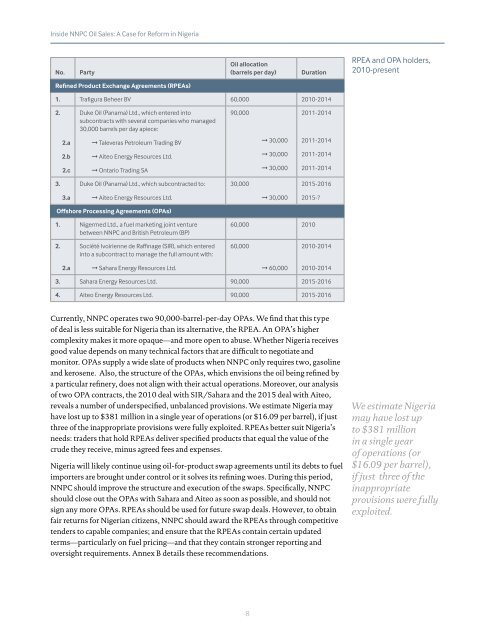<strong>Inside</strong> <strong>NNPC</strong> <strong>Oil</strong> <strong>Sales</strong>: A <strong>Case</strong> <strong>for</strong> Re<strong>for</strong>m <strong>in</strong> <strong>Nigeria</strong>No.Party<strong>Oil</strong> allocation(barrels per day)DurationRPEA and OPA holders,2010-presentRef<strong>in</strong>ed Product Exchange Agreements (RPEAs)1. Trafigura Beheer BV 60,000 2010-20142.Duke <strong>Oil</strong> (Panama) Ltd., which entered <strong>in</strong>tosubcontracts with several companies who managed30,000 barrels per day apiece:90,0002011-20142.a➞ Taleveras Petroleum Trad<strong>in</strong>g BV➞ 30,0002011-20142.b➞ Aiteo Energy Resources Ltd.➞ 30,0002011-20142.c➞ Ontario Trad<strong>in</strong>g SA➞ 30,0002011-20143.Duke <strong>Oil</strong> (Panama) Ltd., which subcontracted to:30,0002015-20163.a➞ Aiteo Energy Resources Ltd.➞ 30,0002015-?Offshore Process<strong>in</strong>g Agreements (OPAs)1. Nigermed Ltd., a fuel market<strong>in</strong>g jo<strong>in</strong>t venturebetween <strong>NNPC</strong> and British Petroleum (BP)60,000 20102.Société Ivoirienne de Raff<strong>in</strong>age (SIR), which entered<strong>in</strong>to a subcontract to manage the full amount with:60,0002010-20142.a➞ Sahara Energy Resources Ltd.➞ 60,0002010-20143. Sahara Energy Resources Ltd. 90,000 2015-20164. Aiteo Energy Resources Ltd. 90,000 2015-2016Currently, <strong>NNPC</strong> operates two 90,000-barrel-per-day OPAs. We f<strong>in</strong>d that this typeof deal is less suitable <strong>for</strong> <strong>Nigeria</strong> than its alternative, the RPEA. An OPA’s highercomplexity makes it more opaque—and more open to abuse. Whether <strong>Nigeria</strong> receivesgood value depends on many technical factors that are difficult to negotiate andmonitor. OPAs supply a wide slate of products when <strong>NNPC</strong> only requires two, gasol<strong>in</strong>eand kerosene. Also, the structure of the OPAs, which envisions the oil be<strong>in</strong>g ref<strong>in</strong>ed bya particular ref<strong>in</strong>ery, does not align with their actual operations. Moreover, our analysisof two OPA contracts, the 2010 deal with SIR/Sahara and the 2015 deal with Aiteo,reveals a number of underspecified, unbalanced provisions. We estimate <strong>Nigeria</strong> mayhave lost up to $381 million <strong>in</strong> a s<strong>in</strong>gle year of operations (or $16.09 per barrel), if justthree of the <strong>in</strong>appropriate provisions were fully exploited. RPEAs better suit <strong>Nigeria</strong>’sneeds: traders that hold RPEAs deliver specified products that equal the value of thecrude they receive, m<strong>in</strong>us agreed fees and expenses.<strong>Nigeria</strong> will likely cont<strong>in</strong>ue us<strong>in</strong>g oil-<strong>for</strong>-product swap agreements until its debts to fuelimporters are brought under control or it solves its ref<strong>in</strong><strong>in</strong>g woes. Dur<strong>in</strong>g this period,<strong>NNPC</strong> should improve the structure and execution of the swaps. Specifically, <strong>NNPC</strong>should close out the OPAs with Sahara and Aiteo as soon as possible, and should notsign any more OPAs. RPEAs should be used <strong>for</strong> future swap deals. However, to obta<strong>in</strong>fair returns <strong>for</strong> <strong>Nigeria</strong>n citizens, <strong>NNPC</strong> should award the RPEAs through competitivetenders to capable companies; and ensure that the RPEAs conta<strong>in</strong> certa<strong>in</strong> updatedterms—particularly on fuel pric<strong>in</strong>g—and that they conta<strong>in</strong> stronger report<strong>in</strong>g andoversight requirements. Annex B details these recommendations.We estimate <strong>Nigeria</strong>may have lost upto $381 million<strong>in</strong> a s<strong>in</strong>gle yearof operations (or$16.09 per barrel),if just three of the<strong>in</strong>appropriateprovisions were fullyexploited.8
<strong>Inside</strong> <strong>NNPC</strong> <strong>Oil</strong> <strong>Sales</strong>: A <strong>Case</strong> <strong>for</strong> Re<strong>for</strong>m <strong>in</strong> <strong>Nigeria</strong>Critically, traders hold<strong>in</strong>g <strong>NNPC</strong>-PPMC swap contracts deliver fuel <strong>in</strong>to the exist<strong>in</strong>gsupply cha<strong>in</strong> <strong>for</strong> <strong>Nigeria</strong>n fuel imports. As the 2012 fuel subsidy scandal revealed, thecomplexity of the supply cha<strong>in</strong> serves a number of entrenched, lucrative rackets aroundshipp<strong>in</strong>g, distribution and sales of fuel. These <strong>in</strong>clude smuggl<strong>in</strong>g, sell<strong>in</strong>g locally ref<strong>in</strong>edproducts back to <strong>NNPC</strong> at import prices, over-charg<strong>in</strong>g <strong>for</strong> deliveries, and outrighttheft. 10 The 2012 fuel subsidy <strong>in</strong>vestigations focused ma<strong>in</strong>ly on the mismanagementof standard import contracts, but we f<strong>in</strong>d that swap imports carry many similar risks.Unless the worst rackets around fuel imports are eradicated, the swaps will hemorrhageconsiderable amounts of fuel and money no matter how they are structured.issue4ProblemsThe abundance of middlemen• <strong>Nigeria</strong> is the only major, stable world oil producer that sells crude mostly to tradersrather than end-users.• <strong>NNPC</strong> enters <strong>in</strong>to term contracts with unqualified <strong>in</strong>termediaries that capturemarg<strong>in</strong>s <strong>for</strong> themselves and create reputational risks <strong>for</strong> legitimate market playerswhile add<strong>in</strong>g little or no value to deals.• <strong>NNPC</strong> also sells to governments that do not ref<strong>in</strong>e the crude they buy. These dealshave featured a glut of unnecessary middlemen, and prompted corruption scandals<strong>in</strong> five buyer countries.Recommendation<strong>NNPC</strong> should stop sell<strong>in</strong>g oil to unqualified companies, whether <strong>Nigeria</strong>n or <strong>for</strong>eign, andimprove its due diligence standards.The marketplace <strong>for</strong> <strong>NNPC</strong> crude is uncommonly crowded with <strong>in</strong>termediaries. By ourcount, <strong>Nigeria</strong> is the world’s only major oil producer (i.e., with average outputs of wellover 1 million barrels per day) that sells almost all of its crude to middlemen, rather thanend-users (with the exception of highly unstable countries like Libya). Over 90 percentof the barrels <strong>NNPC</strong> allocated <strong>in</strong> 2014 went to trad<strong>in</strong>g companies rather than end-users.The names on <strong>NNPC</strong>’s lists of approved buyers, number<strong>in</strong>g 43 <strong>in</strong> 2014, <strong>in</strong>clude a smallgroup of large, experienced <strong>Nigeria</strong>n and <strong>for</strong>eign commodity traders and many lowprofile,<strong>in</strong>experienced “briefcase companies.” This latter group poses especially highgovernance risks. For <strong>in</strong>stance, some reportedly help buyers of the oil to avoid taxesand channel payments to politically exposed persons (PEPs). Involv<strong>in</strong>g middlemenwho serve no commercial function creates a marketplace with greater commercial,reputational and legal risks <strong>for</strong> its legitimate participants, which <strong>in</strong>clude some ofthe world’s lead<strong>in</strong>g trad<strong>in</strong>g houses, banks and ref<strong>in</strong>ers. Past <strong>NNPC</strong> oil sales to thegovernments of Zambia and South Africa are good examples: <strong>in</strong> both, <strong>NNPC</strong> sold to<strong>in</strong>termediaries that lacked basic capacities, which led to corruption scandals <strong>in</strong> thosecountries. (See annex C <strong>for</strong> a full discussion of these government-to-government deals.)Involv<strong>in</strong>g middlemenwho serve nocommercial functioncreates a marketplacewith greater risks<strong>for</strong> its legitimateparticipants.10 See e.g., Virg<strong>in</strong>ie Morillon, and Servais Afouda, “Le trafic illicite des produits pétroliers entre le Bén<strong>in</strong> et<strong>Nigeria</strong>,” Economie Régionale (LARES), 2005; <strong>Nigeria</strong>n House of Representatives, Report of the Ad-HocCommittee To Verify and Determ<strong>in</strong>e the Actual Subsidy Requirements and Monitor the Implementation ofthe Subsidy Regime <strong>in</strong> <strong>Nigeria</strong> (Farouk Lawan, chair) (“the Lawan Report”), April 2012, p.112.9


